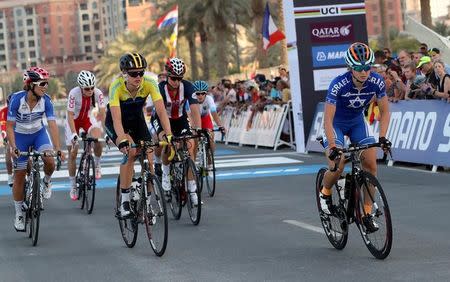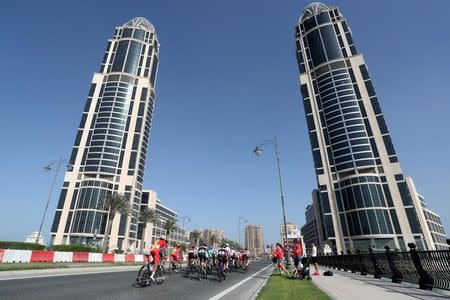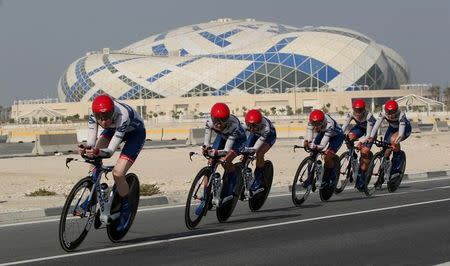Qatari cycling event foreshadows 2022 World Cup strains
By Tom Finn DOHA (Reuters) - Competitors at a world cycling competition in Qatar this month may have enjoyed the hospitality but they also struggled in a swirl of heat, wind, dust and humidity. If the presence of such top cyclists as Peter Sagan and Marc Cavendish for the UCI Road World Championships fed the Gulf state's ambitions of becoming an international sporting capital, the event also highlighted some of the strains the country could face when it hosts the soccer World Cup in 2022. Qatar is using its wealth to host a flurry of big competitions, including the Asian soccer cup, the Men's Handball World Championships, and the FINA World Swimming Championships. It is expected to bid for the 2028 summer Olympic Games. But the push, led by a young emir, is costing billions at a time when low oil and gas prices are crimping budgets. And there are other obstacles. In Qatar's extreme heat, cyclists stuffed ice packs down their jerseys to try and keep cool as temperatures reached 39 degrees Celsius (102 Fahrenheit). The riders struggled in strong desert winds, common throughout the year. On Oct. 9, Dutch cyclist Anouska Koster, crashed off her bike during a race due to heatstroke. Seeking to allay concerns about the heat, Qatar is planning at least five stadiums with built-in air conditioning -- some using solar power -- that it says can be used all year round. FIFA said in 2015 that the World Cup would be switched to winter when temperatures still reach the mid-20 degrees Celsius (75 Fahrenheit) to avoid the fierce heat of June and July. ISRAELI FLAGS The cycling event saw some Qataris revelling in becoming the first Arab hosts of the 89-year-old competition, traditionally held in Western Europe. But only a handful turned out to spectate, opting instead to watch it on television. Others criticised road closures that snarled highways with traffic. The appearance of a team of Israeli riders in the competition led some Qataris to level rare, if oblique, criticisms at their government. Qatari social media users shared pictures of a rider training in Doha with Israeli flags on her jersey and used the hashtag "No to the presence of Zionists in Qatar" to criticize government ministries for "normalizing" Israel. Qatar, like most Arab states, has no formal diplomatic ties with Israel because of the Israeli-Palestinian conflict. It closed an Israeli trade office in Doha after the 2009 Gaza war. But it has hosted Israeli athletes in previous competions, including two beach volleyballers in April, and has said Israel would be allowed to compete in the World Cup should it qualify. "We have no choice but to follow the international sports rules," said Reem, a medical student who declined to give a second name. "Hosting Israelis, yes it makes us feel uncomfortable. But it's better to keep politics out of sport." WOMEN'S BIKE RACE While dust storms, restrictions on alcohol and brutal summer temperatures make Qatar an unlikely sporting hub, officials say sport is at the heart of the country's development and a plan to diversify the economy away from oil and gas. On a Sports Day national holiday Emir Sheikh Tamim makes public appearances and plays football with schoolchildren. Tamim's sister, Sheikha Mayassa, has organised an annual women's bike race since 2009. The country adheres to the same Wahhabi puritanical creed as Saudi Arabia, but women in Qatar are free to drive and Islamic law is only applied to Muslims and Qatari nationals. Some cycling fans bemoaned the lack of alcohol on The Pearl residential island where the races were held, but spectators were able to buy alcohol in nightclubs and restaurants in hotels where drinking is permitted. During the World Cup Qatar has said it will set up designated "fanzones" where fans will be allowed to consume alcohol. The question of whether gay couples would be welcome at sporting events has also come up. Islamic-based legal codes govern Qatar and gay sex is punishable by jail. Gay rights groups have urged Qatar to accept homosexual fans in 2022, when it will be the first Middle Eastern or Muslim country to host the tournament. A Qatari official told Reuters in August that the World Cup would be "inclusive of people and cultures and uphold the essence of Qatar's own traditions" but did not directly address whether the tournament would welcome gay guests. The World Cup has also also shone a negative light on Qatar. Human rights groups have criticised the conditions of foreign workers who are building the new stadiums and facilities. Swiss and U.S. authorities are also investigating FIFA's awarding of the tournament to Qatar. It denies any impropriety. Still, Qatari politicians say hosting sports events is an honour and that cultural differences can be overcome, with sports opening Qatar up to the world. "It brings with it a lot of added value for our country," Ahmed al-Hemaidi, a Qatar Cycling Federation official, told Doha Stadium magazine. (Editing by William Maclean and Angus MacSwan)

 Yahoo Sports
Yahoo Sports 



